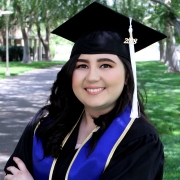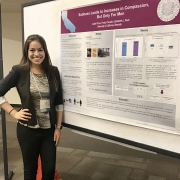For undergraduate instruction, UCR Psychology provides students with a broad range of opportunities in coursework, research experience, and applied internships. Scientific research is a significant focus in the department where most classes emphasize theoretical approaches and also the methods of scientific investigation of critical psychological questions. There are many undergraduate research opportunities in the wide variety of laboratories in the department. General areas of study include thinking and perception, brain and behavior, development and aging, personality and motivation, language and communication, groups and identities, and health and well-being.
Undergraduate students can pursue a Bachelor of Arts (B.A.) or Bachelor of Science (B.S.) degrees in psychology. In addition, we offer interdisciplinary degrees in Law & Society and Neuroscience.
Bachelor of Arts
The B.A. degree in psychology is designed to provide broad exposure to fundamental knowledge in psychology and to methods psychologists use to conduct research.
Bachelor of Science
The B.S. degree in psychology has a similar focus to our B.A. degree. However, there is a greater focus placed on research methodology, theory, and training within the many research labs in our department.
Potential careers: Both the B.A. and B.S. degrees prepare students for graduate studies in psychology. Graduates also go on to careers in personnel work, government services, business administration, probation and parole, mental health work, or positions as trainees in a variety of programs and professions. Others continue to law school, medical school, or social work.
What is the Bachelor of Science degree track?
The Psychology faculty have designed the Bachelor of Science track to help our majors succeed in applying to top, research-focused graduate psychology programs. Students in the Bachelor of Science track get a research-intensive curriculum, with a particular focus on laboratory courses in psychological research and hands-on research experience.
Which students is the Bachelor of Science degree designed to serve?
The Bachelor of Science track is particularly tailored for students who aim to pursue a research career or graduate education in Psychology that involves a research component (e.g., Ph.D., Masters of Psychological Science). Please note, if you are a Psychology, Law & Society major, unfortunately, there is no option to change your major to a Bachelor of Science in Psychology, Law & Society.
What is the application process?
Admission is selective and is open to only a small number of students interested in research. Acceptance is based on overall GPA and acceptable progress towards the Psychology major, including completion of PSYC 1, 2, 11, and 12 with a B- or better (in the first taking). Note that successful applicants traditionally have a cumulative GPA higher than 3.0.
The B.S. Psychology requirement worksheet is provided at this link. Applications are reviewed and admissions decisions are made by the Psychology Undergraduate Education Committee.
How do I apply?
Current B.A. Psychology majors who meet the eligibility criteria will be sent the application information by their academic advisor. The application will be sent in the first two weeks of the quarter after completing the required courses (students who complete these courses in spring/summer will receive the email in the Fall quarter).
The application requires:
- A completed B.S. Application form that addresses the following questions (Please be specific with your answers):
-
- What are your post-graduation career goals?
- How will a B.S. degree in Psychology help you achieve your goals?
- Your unofficial UCR transcript (found in your Student Profile, accessed via R’Web).
Psychology – Law & Society
The Psychology – Law & Society interdisciplinary B.A. degree couples the study of psychology with an interdisciplinary liberal arts approach to the study of legal and law-like relationships and institutions. It provides students a coherent and rigorous program around the theme of law through the lens of psychology.
Potential careers: Similar to those as traditional Psychology majors. Many psychology-law & society majors go on to graduate school in public policy or law school.
Neuroscience
The Neuroscience degree is offered as both a B.A. and B.S. It’s an inter-college major that emphasizes the functioning of the nervous system at the molecular, cellular, system, behavioral and cognitive levels. Some of the topics covered include neuroanatomy, neurophysiology, and neurochemistry in human and other animals.
Potential careers: A bachelor degree in neuroscience, particularly the B.S. degree, prepares students for graduate studies in Neuroscience, while others continue on to applied fields of study (e.g., audiology, speech-language pathology), or medical school. Graduates also go on to careers in the health industry.
Majors and Minors
- B.A. in Psychology Major
- B.S. in Psychology Major
- B.A. or B.S. in Neuroscience Major
- B.A. in Psychology, Law & Society Major
- Minor in Psychology
- Minor in Neuroscience
- Four-Year Sample Plan for a B.A. in Psychology
- Four-Year Sample Plan for a B.A. in Neuroscience
- Four-Year Sample Plan for a B.S. in Neuroscience
- Four-Year Sample Plan for a B.A. in Psychology, Law & Society
- Two-Year Sample Plan for a B.A. in Psychology
- Two-Year Sample Plan for a B.A. or B.S. in Neuroscience
- Two-Year Sample Plan for a B.A. in Psychology, Law & Society












 900 University Ave.
900 University Ave.